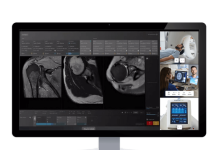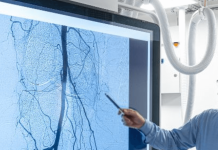Baebies has received U.S. Food and Drug Administration (FDA) 510(k) clearance for its rapid, point-of-care test for glucose-6-phosphate dehydrogenase (G6PD) deficiency. The test is run on the FINDER® platform, which features a toaster-sized instrument and a disposable cartridge. Using a 50 µL blood sample (one drop of blood), FINDER delivers results approximately 15 minutes after sample introduction. Test results display G6PD enzyme activity in units per gram of hemoglobin and adjusted male median values. The company announced completion of CE Mark for FINDER in December 2019.
“This is a significant milestone not only for our company but for patients whose lives can be improved by detection of G6PD deficiency,” said Richard West, co-founder and CEO of Baebies. “FINDER performs rapid testing from just one drop of blood, making testing easier and more accessible. With G6PD as the first FDA-cleared test on our FINDER platform, we look forward to adding many additional types of tests to the versatile and multifunctional platform.”

G6PD deficiency is the most common enzyme deficiency worldwide, affecting approximately 400 million people. A defect in the G6PD enzyme causes premature destruction of red blood cells, which are a key component of the oxygen carrying system. The most common clinical symptom associated with G6PD deficiency is hemolytic anemia, which occurs when red blood cells are destroyed faster than the body can replace them. This type of anemia leads to paleness, jaundice, dark urine, fatigue, shortness of breath, and a rapid heart rate. In addition to causing hemolytic anemia, G6PD deficiency is also a significant cause of mild to severe jaundice in newborns and in some cases, can lead to kernicterus.
“Early diagnosis of G6PD deficiency is critical to ensure children and adults living with G6PD deficiency receive the care they need to manage symptoms and prevent complications later on in life,” said Vamsee Pamula, PhD, co-founder and president of Baebies. “I am proud of our team for pioneering yet another test and this time for point of care use so clinicians can identify patients with G6PD deficiency and intervene with support so they can stay healthy.”
Vinod K. Bhutani, MD, FAAP, Professor Emeritus of Pediatrics at Stanford University School of Medicine, and his team of researchers were the first to evaluate the FINDER G6PD assay, assessing device performance and comparing the test to known reference methods. Results of the evaluation were published in Seminars in Perinatology in 2020.
“Recent updates to the AAP clinical practice guidelines on hyperbilirubinemia delineate an urgent need to identify G6PD deficient newborns so as to institute timely interventions such that educational, preventive and treatment options are offered soon after birth,” said Bhutani. “Implementation of this mode of assay in nurseries will allow clinicians to know G6PD enzyme activity before a newborn is discharged from the hospital. In fact, FDA clearance of Baebies’ digital microfluidics assay introduces a new and important diagnostic solution to identify infants with G6PD deficiency, which is among the most important causes of hyperbilirubinemia leading to kernicterus in the U.S. and worldwide.”
The FINDER platform is powered by digital microfluidics (DMF) technology – a method to programmably manipulate tiny droplets of liquid by electrical control of surface tension on a disposable cartridge. DMF technology eliminates the need for mechanical pumps or valves for liquid handling, reducing the required sample volume and providing fast and reliable diagnostic results.
“Our research with Baebies has shown that the FINDER digital microfluidics platform provides rapid G6PD results using a small amount of blood,” said Beverly Rogers, MD, Chief of Pathology at Children’s Healthcare of Atlanta and Adjunct Professor of Pathology and Pediatrics at Emory University School of Medicine. “Identifying G6PD deficient patients provides potentially critical information to providers, and ensures this condition is considered when clinical care decisions are made.”
G6PD deficiency is the first of several assays under development on the FINDER platform. Additional assays under development are focused on addressing unmet needs in hematology and infectious disease through multifunctional syndromic testing, where a seamless combination of multiple types of tests (molecular, chemistry, hematology, immunology, etc) are performed on a single platform to resolve the signs and symptoms associated with a clinical condition.
The FINDER platform and its underlying digital microfluidics technology have been recognized through multiple awards, including the coveted Disruptive Technology Award from the American Association for Clinical Chemistry (AACC), which recognizes innovative testing solutions that will transform patient care.
“From recognition by AACC as a disruptive technology to FDA cleared, Baebies’ FINDER technology is an inspiring example of innovation at work,” said former AACC president David Grenache, PhD, DABCC. “Congratulations to the Baebies team on this monumental achievement that is sure to have a positive impact on patient care.”
About Baebies
Baebies is a growth-stage medical device company developing innovative products to enable early disease detection and multifunctional diagnostics for syndromic testing for children and adults. Guided by the vision that “everyone deserves a healthy start,” we deliver millions of tests globally every year to save lives and make lives better. Baebies is a pioneer in digital microfluidics, which maximizes diagnostic yield from low-volume samples. Baebies is headquartered in Durham, North Carolina, and our products are used in central laboratories and point of care settings around the world.
Are you Hiring?




